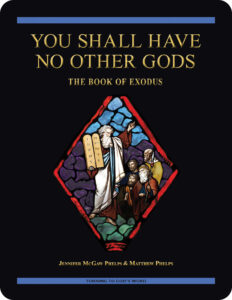 You Shall Have No Other Gods:
You Shall Have No Other Gods:
The Book of Exodus
Lesson 16 God Speaks to Moses on the Mountain
the book of Exodus 19:1–25
Revised Standard Version Catholic Edition (RSVCE)*
New American Bible Revised Edition (NABRE)*
Catechism of the Catholic Church
ex libris (in our library)
glossary for the book of Exodus
cross references in the book of Exodus
next lesson: The Ten Commandments
This material coordinates with Lesson 16 on pages 78–81 in the study book You Shall Have No Other Gods: The Book of Exodus.
And God spoke all these words, saying, ‘I am the LORD your God, who brought you out of the land of Egypt, out of the house of bondage. You shall have no other gods before me. You shall not make for yourself a graven image, or any likeness of anything that is in heaven above, or that is in the earth beneath, or that is in the water under the earth; you shall not bow down to them or serve them; for I the LORD your God am a jealous God, visiting the iniquity of the fathers upon the children to the third and the fourth generation of those who hate me, but showing mercy to thousands of those who love me and keep my commandments.”—the book of Exodus 20:1–6
welcome to our in-depth study of the book of Exodus
We invite interested groups and individuals to check out the sample first lesson from this 28- lesson Turning to
lesson Turning to  God’s Word Catholic Bible study. These online study pages link to our free lesson video overviews, as well as to a glossary and cross references in the biblical text. Other study aids include maps, additional commentary, and prayers based on the primary Scripture in each lesson. You Shall Have No Other Gods: The Book of Exodus has been granted an imprimatur and can be purchased from our website shop. If you have a Bible-study question or comment, click on one of the “ask us your question” or “what do you think” buttons on any online study page.
God’s Word Catholic Bible study. These online study pages link to our free lesson video overviews, as well as to a glossary and cross references in the biblical text. Other study aids include maps, additional commentary, and prayers based on the primary Scripture in each lesson. You Shall Have No Other Gods: The Book of Exodus has been granted an imprimatur and can be purchased from our website shop. If you have a Bible-study question or comment, click on one of the “ask us your question” or “what do you think” buttons on any online study page.
open with prayer
It’s always wise to begin any Bible study with prayer, whether reading the Scriptures alone or meeting with others in a discussion group. You can pray using your own words or use one of the opening prayers on our website. We especially like the following:
Lord Jesus, you promised to send your Holy Spirit to teach us all things.
As we read and study your word today,
allow it to touch our hearts and change our lives. Amen.
let’s review—the book of Exodus 18:1–27
Lesson 15 Moses Receives Wise Counsel looks at an event in the book of Exodus that’s often ignored. Moses’ father-in-law Jethro visits him and the Israelites in the wilderness. He brings with him Moses’ wife and two sons, Gershom and Eliezer. In the future, the Israelites will place much emphasis on the descendants of Aaron, but after this point in Scripture no more will be heard about the descendants of Moses—even though Moses and Aaron are brothers and both have been born into the tribe of Levi. What’s surprising about Jethro’s visit is that during the short time he’s there he acknowledges the superiority of the God of the Hebrews, offers sacrifice to the LORD, and counsels Moses about how to organize the Israelites around a system involving judges and laws. Jethro, who’s described in Scripture as “the priest of Midian,” is a descendant of Abraham but not of Isaac or Jacob. So even though he’s not an Israelite, he’s responsible for pointing out effective ways for Moses to continue functioning as the religious leader of the Israelites. Moses wisely takes his father-in-law’s advice.
map notes—the Israelites are staying put for a bit
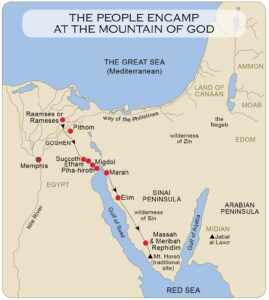 There’s no map with the next few lessons. The Israelites are camping out at the mountain of God in the wilderness. Tradition holds that this is Mount Horeb, also identified as Mount Sinai on the Sinai Peninsula. Scholars debate whether this is the same location at which the LORD appeared to Moses in the burning bush, an event described in the third chapter in the book of Exodus (the biblical text for Lesson 3, “God Reveals His Name: ‘I AM WHO I AM’,” in You Shall Have No Other Gods: The Book of Exodus.) There’s some evidence that the mountain Jabal al Lawz on the Arabian Peninsula may be the location at which God first appeared to Moses, and also the location where the people encamped. For more information see the commentary, “Where Is the Mountain of God?” on page 19 in You Shall Have No Other Gods: The Book of Exodus. Click on the map (right) to enlarge it. The original map is included with Lesson 15 on page 77 in the study book and on the online study page for that lesson.
There’s no map with the next few lessons. The Israelites are camping out at the mountain of God in the wilderness. Tradition holds that this is Mount Horeb, also identified as Mount Sinai on the Sinai Peninsula. Scholars debate whether this is the same location at which the LORD appeared to Moses in the burning bush, an event described in the third chapter in the book of Exodus (the biblical text for Lesson 3, “God Reveals His Name: ‘I AM WHO I AM’,” in You Shall Have No Other Gods: The Book of Exodus.) There’s some evidence that the mountain Jabal al Lawz on the Arabian Peninsula may be the location at which God first appeared to Moses, and also the location where the people encamped. For more information see the commentary, “Where Is the Mountain of God?” on page 19 in You Shall Have No Other Gods: The Book of Exodus. Click on the map (right) to enlarge it. The original map is included with Lesson 15 on page 77 in the study book and on the online study page for that lesson.
 don’t overlook this section of the book of Exodus (01:04:52)
don’t overlook this section of the book of Exodus (01:04:52)
Although this section of the book of Exodus doesn’t receive a lot of attention, it  represents a major development in God’s relationship with humanity. On the video for this lesson, Turning to God’s Word author Matthew Phelps discusses how the biblical text reflects the feeling of the people being so near and yet so far from their goal. They can come to the base of the mountain, but they can go no farther. Although not stated explicitly, there’s a sense that surely this isn’t what God has in mind. This represents the state of humanity at this point in time. It’s the
represents a major development in God’s relationship with humanity. On the video for this lesson, Turning to God’s Word author Matthew Phelps discusses how the biblical text reflects the feeling of the people being so near and yet so far from their goal. They can come to the base of the mountain, but they can go no farther. Although not stated explicitly, there’s a sense that surely this isn’t what God has in mind. This represents the state of humanity at this point in time. It’s the  problem God is working to fix, which only will be resolved by a better mediator than Moses who can offer a better covenant. The best Moses and this covenant can do is get them to the foot of the mountain. This is a powerful metaphor for the law and the Old Covenant. The people are right to be afraid. In their current state, going up the mountain would mean certain death.
problem God is working to fix, which only will be resolved by a better mediator than Moses who can offer a better covenant. The best Moses and this covenant can do is get them to the foot of the mountain. This is a powerful metaphor for the law and the Old Covenant. The people are right to be afraid. In their current state, going up the mountain would mean certain death.
The Scripture ranges for the videos that accompany this Catholic Bible study from Turning to God’s Word match the Scripture ranges for the sets of questions in You Shall Have No Other Gods: The Book of Exodus. You can follow along as Turning to God’s Word author Matthew Phelps discusses Lesson 16, “God Speaks to Moses on the Mountain,” on pages 78–81 in the study book.
the mountain is an important religious image
While there’s scholarly debate over the exact location where God comes to meet his people, there’s no question that the LORD descends on a mountain. Throughout the Scriptures, in both the Old and the New Testaments, mountains regularly are seen as places to encounter God. In the ancient world, people thought that heaven was the place where God dwelt, and this was understood to be a place that men and women couldn’t go. Because it was impossible to go up into the sky (the word translated as “heaven” in Scripture literally means “the sky”), the idea quickly developed that the next best thing to going to heaven was to climb  to the highest geographical point possible. In the book of Genesis 11:1–10, the earliest people attempt to build the tower of Babel in order to “make a name for themselves,” a phrase that suggests a desire to become like God by approaching similar heights to where the LORD is thought to dwell. You can learn more about that period of time in salvation history in Lesson 7 Canaan: A Slave of Slaves in the Turning to God’s Word Catholic Bible study In the Beginning: The Book of Genesis.
to the highest geographical point possible. In the book of Genesis 11:1–10, the earliest people attempt to build the tower of Babel in order to “make a name for themselves,” a phrase that suggests a desire to become like God by approaching similar heights to where the LORD is thought to dwell. You can learn more about that period of time in salvation history in Lesson 7 Canaan: A Slave of Slaves in the Turning to God’s Word Catholic Bible study In the Beginning: The Book of Genesis.
major spiritual events that occur on mountains
Take a moment or two to think about how many biblical events involve people encountering God on a mountain. In addition to Moses’ encounter with God at the burning bush in the third chapter in the book of Exodus, and now God coming down on a mountain to meet the Israelites in the wilderness, there are many other spiritually significant sites recorded in the Bible. When in the book of Genesis 14:18–20 Abram (later renamed Abraham by God) meets Melchizedek (the first priest mentioned in the Old Testament), Melchizedek is described as king of Salem, believed to be the same mountain location that later become Jerusalem. In the First Book of the Kings 19:11–13, the prophet Elijah meets God on Mount Horeb. In the New Testament, all three synoptic Gospel writers describe Jesus’ Transfiguration as  taking place on Mount Tabor—the Gospels According to Matthew 17:1–8, Mark 9:2–8, and Luke 9:28–36. The Second Letter of Peter 1:16–18 also refers to the Transfiguration. Although the Gospel According to John doesn’t mention this event, the synoptic Gospels all describe John as being one of the three disciples who accompanied Jesus up the mountain.
taking place on Mount Tabor—the Gospels According to Matthew 17:1–8, Mark 9:2–8, and Luke 9:28–36. The Second Letter of Peter 1:16–18 also refers to the Transfiguration. Although the Gospel According to John doesn’t mention this event, the synoptic Gospels all describe John as being one of the three disciples who accompanied Jesus up the mountain.
what Matthew says—what the mountain represents now
So what’s with mountains for present-day Christians? In the video, Turning to God’s Word  author Matthew Phelps
author Matthew Phelps  points out that drawing close to God always requires that men and women expend energy to move into the realm of holiness. Climbing the mountain entails physical death. It isn’t so much that climbing the mountain kills you as it is that death is much less a big deal when it’s not binding. The restrictions around the base of the mountain (the sacred space where God is) never are lifted. What’s changed as a result of Jesus’ Passion, death, and Resurrection is human tolerance for death and ability to enter into eternal life in the Body of Christ, the Church. Learn more in “Approaching God Is an Uphill Climb” on page 81 in You Shall Have No Other Gods: The Book of Exodus.
points out that drawing close to God always requires that men and women expend energy to move into the realm of holiness. Climbing the mountain entails physical death. It isn’t so much that climbing the mountain kills you as it is that death is much less a big deal when it’s not binding. The restrictions around the base of the mountain (the sacred space where God is) never are lifted. What’s changed as a result of Jesus’ Passion, death, and Resurrection is human tolerance for death and ability to enter into eternal life in the Body of Christ, the Church. Learn more in “Approaching God Is an Uphill Climb” on page 81 in You Shall Have No Other Gods: The Book of Exodus.
pray with the Psalms—what does God’s voice sound like?
A revelation about God that can be traced to the book of Exodus describes the sound of the LORD’s  voice, which is heard in thunder—and so cannot be ascribed to any physical source. The first chapter in the book of Genesis describes the voice of God as performative. It’s responsible for bringing about Creation. Psalm 29, known as the “Psalm of Seven Thunders,” includes God’s voice sounding like thunder. In the New Testament, the book of Revelation 10:4 suggests that God speaks through seven thunders, and the book of Revelation 14:1–3 implies that God’s voice sounds like loud thunder. How is the voice of God performative in these Scripture passages; what happens as a result of God
voice, which is heard in thunder—and so cannot be ascribed to any physical source. The first chapter in the book of Genesis describes the voice of God as performative. It’s responsible for bringing about Creation. Psalm 29, known as the “Psalm of Seven Thunders,” includes God’s voice sounding like thunder. In the New Testament, the book of Revelation 10:4 suggests that God speaks through seven thunders, and the book of Revelation 14:1–3 implies that God’s voice sounds like loud thunder. How is the voice of God performative in these Scripture passages; what happens as a result of God  speaking? Prayed at Monday Vigils (Weeks I and II), Psalm 29 will be included as part of Lesson 3 You, LORD, Are a Shield About Me and Lesson 17 The God of Glory Thunders, both in the Turning to God’s Word Catholic Bible study Sing a New Psalm: Communicating with God Through the Prayers of the Church—Volume II: Vigils, Day Prayer & Compline, which is scheduled for publication in 2025.
speaking? Prayed at Monday Vigils (Weeks I and II), Psalm 29 will be included as part of Lesson 3 You, LORD, Are a Shield About Me and Lesson 17 The God of Glory Thunders, both in the Turning to God’s Word Catholic Bible study Sing a New Psalm: Communicating with God Through the Prayers of the Church—Volume II: Vigils, Day Prayer & Compline, which is scheduled for publication in 2025.
cloud—you could look it up in our archives
The book of Exodus 19:16 describes God descending on the mountain in the wilderness amid thunder, lightning, a loud  trumpet blast, and a thick cloud. You can learn more about why the word “cloud” is used as an image for the Holy Spirit and why the LORD might have taken such dramatic steps to ensure that his people were aware of his presence, by reading Lost in Translation, an online column in which Turning to God’s Word author Matthew Phelps helps readers connect with ideas expressed in the original languages of the Scriptures. New Lost in Translation entries are posted on Mondays, and past entries are archived on our website. Contact us if you’d like to receive Lost in Translation by email every week.
trumpet blast, and a thick cloud. You can learn more about why the word “cloud” is used as an image for the Holy Spirit and why the LORD might have taken such dramatic steps to ensure that his people were aware of his presence, by reading Lost in Translation, an online column in which Turning to God’s Word author Matthew Phelps helps readers connect with ideas expressed in the original languages of the Scriptures. New Lost in Translation entries are posted on Mondays, and past entries are archived on our website. Contact us if you’d like to receive Lost in Translation by email every week.
ex libris—Sinai gives meaning to the Promised Land
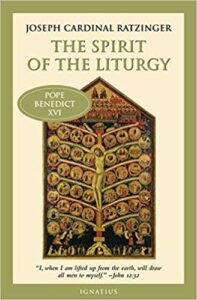
 The Spirit of the Liturgy by Pope Benedict XVI looks at how what happens at Sinai is crucially related to the LORD’s motivation for bringing his people out of Egypt and leading them to the Promised Land of Canaan. The Spirit of Liturgy is aimed at helping readers deepen their understanding of the “great prayer of the Church,” and in it the author looks at the essence of worship, the Jewish roots of Christian prayer, and the relationship of the liturgy to time and space. The section on the place of the liturgy in reality deals with the importance of Sinai in God’s plan for the Israelites—and for present-day Christians. At ex libris—main bookshelf, you can learn more about The Spirit of the Liturgy and other works related to Bible study.
The Spirit of the Liturgy by Pope Benedict XVI looks at how what happens at Sinai is crucially related to the LORD’s motivation for bringing his people out of Egypt and leading them to the Promised Land of Canaan. The Spirit of Liturgy is aimed at helping readers deepen their understanding of the “great prayer of the Church,” and in it the author looks at the essence of worship, the Jewish roots of Christian prayer, and the relationship of the liturgy to time and space. The section on the place of the liturgy in reality deals with the importance of Sinai in God’s plan for the Israelites—and for present-day Christians. At ex libris—main bookshelf, you can learn more about The Spirit of the Liturgy and other works related to Bible study.
“… Now it becomes clear that what took place on Sinai, in the period of rest after the wandering through the wilderness, is what gives meaning to the taking of the land. Sinai is  not a halfway house, a kind of stop for refreshment on the road to what really matters. No, Sinai gives Israel, so to speak, its interior land without which the exterior one would be a cheerless prospect. Israel is constituted as a people through the covenant and the divine law it contains. It has received a common rule for righteous living. This and this alone is what makes the land a real gift. Sinai remains present in the Promised Land. When the reality of Sinai is lost, the Land, too, is inwardly lost, until finally the people are thrust into exile. Whenever Israel falls away from the right worship of God, when it turns away from God to the false gods (the powers and values of this world), its freedom, too, collapses.”
not a halfway house, a kind of stop for refreshment on the road to what really matters. No, Sinai gives Israel, so to speak, its interior land without which the exterior one would be a cheerless prospect. Israel is constituted as a people through the covenant and the divine law it contains. It has received a common rule for righteous living. This and this alone is what makes the land a real gift. Sinai remains present in the Promised Land. When the reality of Sinai is lost, the Land, too, is inwardly lost, until finally the people are thrust into exile. Whenever Israel falls away from the right worship of God, when it turns away from God to the false gods (the powers and values of this world), its freedom, too, collapses.”
the LORD wants to enter into covenant with the Israelites
The nineteenth chapter in the book of Exodus describes a major development in the history of God’s relationship with humanity. Prior to this time, the Old Covenant was enacted with a single person (Abraham) and passed to his son Isaac, who in turn passed it on to his son Jacob after Esau sold his birthright to Jacob for some stew. In this section of the book of Exodus, the LORD now is offering to be in a covenant relationship with all of the descendants of Jacob. You can learn more by reading the vocabulary box, “Covenant,” on page 80 in You Shall Have No Other Gods: The Book of Exodus.
Q&A—where do we find the designation “chosen people”?
A participant in one of our studies asks what Scripture passage refers to the descendants of Jacob as the “chosen people.” Although the term commonly is used to describe Jews, and most people accept that it developed from some event in salvation history, few people are able to identify that event.
 Q: What led to the descendants of Jacob being called God’s chosen people, and where can a description of this be found in Scripture?
Q: What led to the descendants of Jacob being called God’s chosen people, and where can a description of this be found in Scripture?
A: Although the term “chosen people” isn’t used much in Scripture, the first—and perhaps only—direct reference to the descendants of Jacob being “chosen” appears in the book of Deuteronomy 7:6: “For you are a people holy to the LORD your God; the LORD your God has chosen you to be a people of his own possession, out of all the peoples that are on the face of the earth.” The narrator is Moses, allegedly the author of the Torah, though many biblical scholars dispute that. The book of Deuteronomy describes Moses’ death, and it seems unlikely that he’d have written or even known those details in advance—and afterward he wouldn’t have been alive to record what happened.
The book of Deuteronomy describes and expands on many events covered in other books of the Torah (the first five books of the Old Testament). It makes sense that this verse from the book of Deuteronomy is the source of the idea of “chosen” people. Prior to Moses, God made his covenant with individual people—Abraham, Isaac, and Jacob (and earlier with Adam and then Noah). The covenant God makes with Moses is with all of the descendants of Jacob and is ratified by all of them. It’s also the same basic covenant from earlier, just extended to an entire people. It’s most frequently expressed in Scripture as “I will be your God and you will be my people,” but it always boils down to “if you sin, you die.” In the New Testament Jesus gets around the dying part by not sinning. As God, Jesus obviously can do this, but to effect salvation for any of the rest of us, Jesus also has to be fully human when he avoids all sin. As a consequence of that, the human Jesus (who also is divine) then is able to defeat death. “If you don’t sin, you don’t die.”
God previously chose individuals to be in relationship with him, but when God enters into covenant with Moses and leads the people out of bondage, God “chooses” all the people.
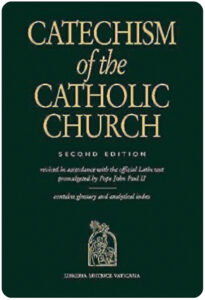 the best Catholic commentary about Scripture
the best Catholic commentary about Scripture
To find out more about how Church teaching is supported by Scripture passages in You Shall Have No Other Gods: The Book of Exodus, check out the Index of Citations in the Catechism of the Catholic Church. Links (Revised Standard Version Catholic Edition [RSVCE*]) to the primary Scripture passages in the lesson and relevant paragraphs in the Catechism are provided here. Not every passage in the biblical text for this Catholic study is referenced in a Catechism paragraph, however.
the book of Exodus 19:1–25—paragraph 2060
the book of Exodus 19:1:1—20:25—paragraph 708
the book of Exodus 19:5–6—paragraphs 709, 762, 2810
the book of Exodus 19:6—paragraphs 63, 1539
the book of Exodus 19:16—paragraph 2085
ways our glossary might prove helpful
In addition to providing extra information about geographical locations, our glossary also points out  when a person or place is mentioned in the biblical text under more than one name or more than one spelling. If you can remember a name but aren’t sure in which lesson it shows up, you can find it in the glossary, which lists every proper noun that appears in the biblical text for every lesson in You Shall Have No Other Gods: The Book of Exodus.
when a person or place is mentioned in the biblical text under more than one name or more than one spelling. If you can remember a name but aren’t sure in which lesson it shows up, you can find it in the glossary, which lists every proper noun that appears in the biblical text for every lesson in You Shall Have No Other Gods: The Book of Exodus.
to learn more, read more Scripture
If you’re having difficulty with a particular passage of Scripture, it can be helpful to read the relevant  cross references—but looking these up can take time. To make that easier, we’ve compiled the cross references from the Revised Standard Version Second Catholic Edition (RSV2CE)—the translation that we reprint in our study books. That list can be found at the top of every online study page accompanying this study, and it includes links to each of the cross references in the primary biblical text for You Shall Have No Other Gods: The Book of Exodus.
cross references—but looking these up can take time. To make that easier, we’ve compiled the cross references from the Revised Standard Version Second Catholic Edition (RSV2CE)—the translation that we reprint in our study books. That list can be found at the top of every online study page accompanying this study, and it includes links to each of the cross references in the primary biblical text for You Shall Have No Other Gods: The Book of Exodus.
don’t forget about our indexes & extra online material

 If you’re trying to locate information about a specific Scripture passage, you can look it up in the index at the back of the study book or sample lesson. If you want to find a particular commentary, you can look up its title in the topics index. To learn more about another book of the Bible for which there’s a Turning to God’s Word study, visit the online study directories to read the commentaries and watch any accompanying videos. Finally, if you have a question or would like to make a comment about any of our studies, you can use one of the “ask us your question” or “what do you think” buttons to email our authors.
If you’re trying to locate information about a specific Scripture passage, you can look it up in the index at the back of the study book or sample lesson. If you want to find a particular commentary, you can look up its title in the topics index. To learn more about another book of the Bible for which there’s a Turning to God’s Word study, visit the online study directories to read the commentaries and watch any accompanying videos. Finally, if you have a question or would like to make a comment about any of our studies, you can use one of the “ask us your question” or “what do you think” buttons to email our authors.
ex libris—Church documents & books about religious topics
Link to magisterial documents referred to in our Bible studies at ex libris—magisterial documents.  This listing includes significant recent encyclicals as well as a number of historical Church documents. Recommended books related to Scripture study can be found at ex libris—main bookshelf.
This listing includes significant recent encyclicals as well as a number of historical Church documents. Recommended books related to Scripture study can be found at ex libris—main bookshelf.
wondering how to pronounce some of these words?
The following link is to a reading from the New International Version (NIV) Bible. To listen, open the link and click on the audio icon above the printed text. Although not taken from the translations used in our study materials, the NIV reading provides an audio guide to pronunciation of words in this lesson’s primary biblical text. A close online version of the translation of the Bible used in Catholic liturgy in the United States as well as an audio guide for daily Mass readings for the current month can be found on the website of the United States Conference of Catholic Bishops (USCCB).
the book of Exodus 19:1–25 (NIV)
 close with Bible-based prayer related to this lesson
close with Bible-based prayer related to this lesson
Many of our Catholic study groups like to conclude their discussions with a prayer based on the scriptural focus of their lesson, and some participants include Scripture-specific prayer in their individual study. If you’re uncomfortable composing your own Bible-based prayers, you can follow our four easy steps. If you prefer, you can use the following short prayer based on this lesson’s text from the book of Exodus.
Father, you inspired Moses to respond to your call
in a way that brought about
positive results for others.
Help us to embrace your guidance
as we struggle to accept your will in our lives.
We ask this in the name of Jesus Christ,
whose obedience is a beacon of light showing the way to you. Amen.
Lesson 17 The Ten Commandments, the book of Exodus 20:1–26
Lesson 15 Moses Receives Wise Counsel, the book of Exodus 18:1–27
you also may like our study of Saul, David & Solomon
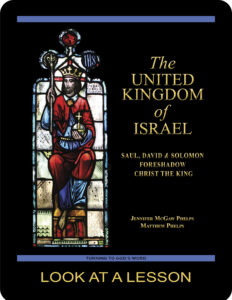 The United Kingdom of Israel: Saul, David & Solomon Foreshadow Christ the King, a 28-lesson Catholic Bible study with an imprimatur, provides an in-depth look at the First and Second Books of Samuel to learn how the lives of the monarchs Saul, David, and Solomon point ahead to the kingdom of heaven. The unified reign of King David is seen as a foreshadowing or type of the unity that is one of the four marks of the Church—the kingdom of God—established by Jesus Christ. Click on the book’s cover to view a sample lesson.
The United Kingdom of Israel: Saul, David & Solomon Foreshadow Christ the King, a 28-lesson Catholic Bible study with an imprimatur, provides an in-depth look at the First and Second Books of Samuel to learn how the lives of the monarchs Saul, David, and Solomon point ahead to the kingdom of heaven. The unified reign of King David is seen as a foreshadowing or type of the unity that is one of the four marks of the Church—the kingdom of God—established by Jesus Christ. Click on the book’s cover to view a sample lesson.
start a Turning to God’s Word Bible study
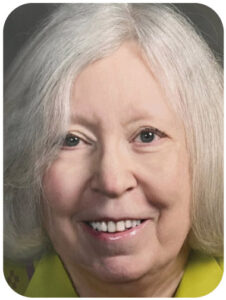 Thank you for your interest in You Shall Have No Other Gods: The Book of Exodus.
Thank you for your interest in You Shall Have No Other Gods: The Book of Exodus.  Information about beginning a Turning to God’s Word Bible study can be found at start a Bible study. Tami, Matthew, and I are available to answer your questions and to offer support. You may use this email to contact us directly if you’re interested in starting a Turning to God study or in having your study schedule listed with other TtGW study groups on our website. —Jennifer
Information about beginning a Turning to God’s Word Bible study can be found at start a Bible study. Tami, Matthew, and I are available to answer your questions and to offer support. You may use this email to contact us directly if you’re interested in starting a Turning to God study or in having your study schedule listed with other TtGW study groups on our website. —Jennifer
*There are seven deuterocanonical books in the Old Testament—the Books of Tobit, Judith, Wisdom, Sirach, Baruch, and First and Second Maccabees, as well as some passages in the Books of Esther and Daniel. Protestants usually refer to these works as “apocryphal,” a word that means “outside the (Protestant) canon” because they’re excluded from most Protestant Bibles. The word “deuterocanonical” means “second canon”; Catholics use that word to refer to any section of the Catholic Old Testament for which there are no extant, or existing, Hebrew manuscripts. All of the deuterocanonical books appear in the Septuagint, the earliest remaining versions of which date to the 1st century B.C. This Greek translation of the Old Testament was in common use by Jews at the time of Jesus—but the same books aren’t found in existing Hebrew manuscripts, which aren’t as old as the oldest version of the Septuagint. Learn more by reading How Do Catholic & Protestant Bibles Differ?
Turning to God’s Word printed Bible studies use the 2006 Revised Standard Version Second Catholic Edition (RSV2CE) translation for all Scripture references except those to the Psalms, which are taken from The Abbey Psalms and Canticles, prepared by the Benedictine monks of Conception Abbey and published in 2020 by the United States Conference of Catholic Bishops (USCCB). All Scripture links for the online study pages for You Shall Have No Other Gods: The Book of Exodus are to the 1966 Revised Standard Version Catholic Edition (RSVCE) translation. The New International Version (NIV) audio recordings follow the same chapter and verse numbering as the RSV Catholic translations, but the NIV translation doesn’t include the deuterocanonical books and passages.
The 1966 RSVCE uses archaic pronouns and verb forms such as “thee,” “thou,” “didst” in the Psalms and in direct quotations attributed to God. The 2006 RSV2CE replaces those with more accessible English. The few significant translation changes in the RSV2CE include rendering almah as “virgin” in the Book of Isaiah 7:14 and restoring the term “begotten” in the Gospel According to John 3:16.
Numbering varies for some passages in this Bible study. Turning to God’s Word studies (print and digital) follow the numbering in the Revised Standard Version Catholic translations (RSV2CE and RSVCE). Discrepancies in the New American Bible Revised Edition (NABRE) are noted in the Index of Scripture Citations in the study book and the online sample.
 You can learn more about the Psalms by viewing a sample lesson from the Turning to God’s Word Catholic Bible study Sing a New Psalm: Communicating with God Through the Prayers of the Church—Volume I: Lauds & Vespers. The second part of that study, Sing a New Psalm: Communicating with God Through the Prayers of the Church—Volume II: Vigils, Day Prayer & Compline, is scheduled for publication in 2025. Some verse numbers may vary in different translations of the Psalms.
You can learn more about the Psalms by viewing a sample lesson from the Turning to God’s Word Catholic Bible study Sing a New Psalm: Communicating with God Through the Prayers of the Church—Volume I: Lauds & Vespers. The second part of that study, Sing a New Psalm: Communicating with God Through the Prayers of the Church—Volume II: Vigils, Day Prayer & Compline, is scheduled for publication in 2025. Some verse numbers may vary in different translations of the Psalms.
